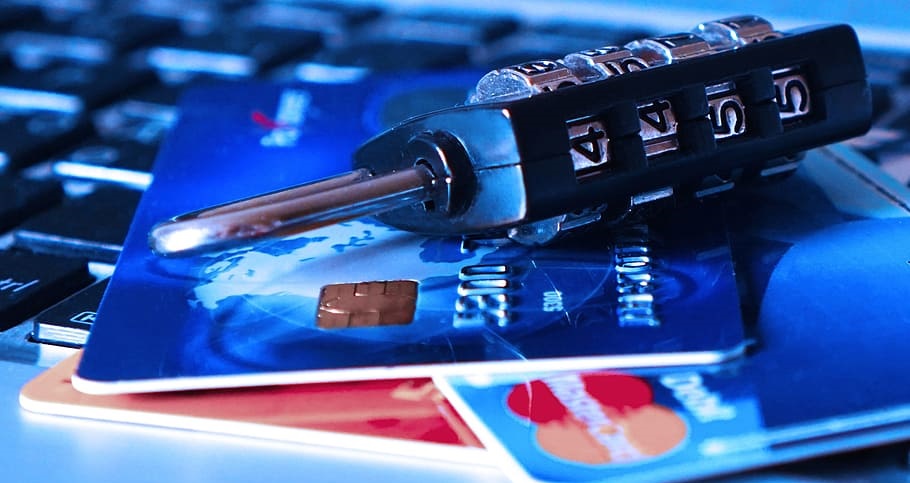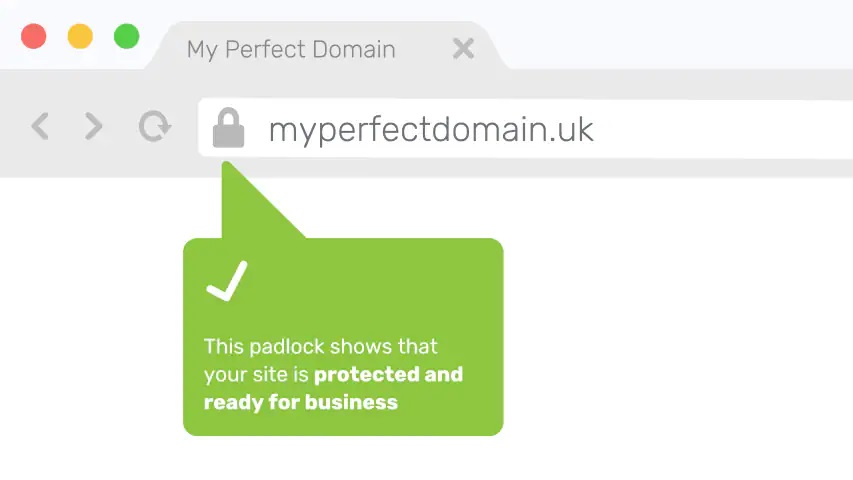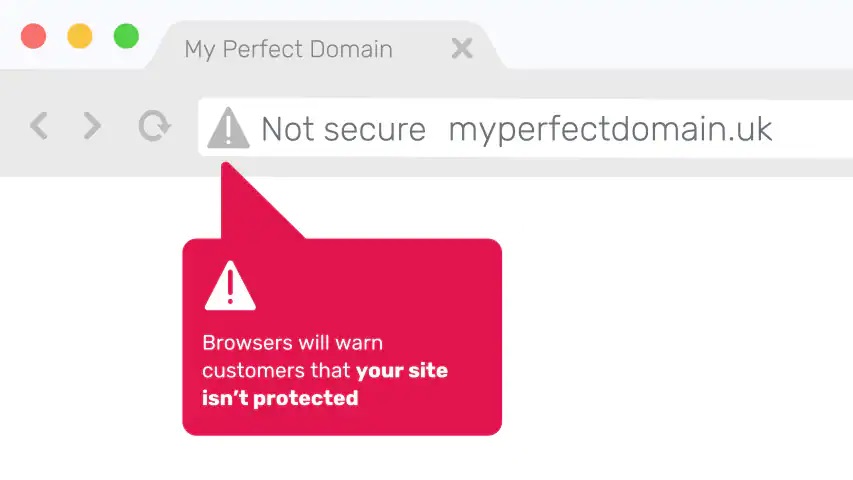7 Reasons Why SSL Certificates are Essential for Websites
We’ve all seen that little padlock icon when shopping online — sat reassuringly close to the web address. As we’ll discover, this symbol offers much more than just a sense of safety. SSL Certificates play a huge role in protecting our personal data on the net. They help all kinds of website owners to build a trustworthy and credible online presence. And if your plan is to sell products or services online, there are few better ways to tell customers: I mean business.

Cast your mind back to the early days of the internet, if you can — Windows 95 booting up on a chunky CRT monitor, 56k modem chirping down your only telephone line. The mid-1990s marked the first time many of us ever sent an email across the world. Perhaps it was the first time you added an item to your digital basket and paid for it online. Oh, how we marvelled at our new global connectivity.
Yet, there was one major snag: online security.
Or rather, the lack of it. The problem lay in how browsers and servers very casually moved our data around. For the most part, it was all exchanged in simple plain text. Like an open book. Sensitive data was out there to be picked up by anyone with ill intentions. Imagine scribbling credit card numbers on a napkin every time you go to buy a coffee.
Everyone wants to keep their data safe. For the internet to become a place where people could shop, share, and interact with confidence, there had to be a better way to protect the information passing through. What was needed was a kind of secure courier service — a private envelope that could be signed, sealed, delivered.
This is where SSL Certificates come in.
What do SSL Certificates do?
SSL Certificates are a clever way to protect user information and defend against hackers. The initials stand for Secure Sockets Layer, though don’t let that put you off. In a nutshell, SSL is there to establish a trusted and secure link between your browser and the website you’re on.
Like two people meeting for the first time, browsers and servers want to say “Hello” and have a good handshake. But your browser is rightly suspicious when meeting new people. It needs to know strangers really are who they say they are. It asks: “Can I see some ID, please?”
With that, it’s then up to the server to come up with the credentials: its SSL Certificate. If the details check out with the browser (both valid and in date) then it forms the beginnings of a trustworthy relationship.
SSL Certificates are like passports, in this sense. Crucially, each SSL Certificate is issued and regulated by a third party, known as a Certificate Authority (CA). It’s the job of a CA to check that a website is indeed owned by the entity that claims it, ensuring, for example, that an online shop is connected to a real company. In fact, 96.3% of all SSL certificates online are issued by just 9 Certificate Authorities.
There are more than 2.5 million SSL Certificates on the internet, according to BuildWith, which empower security for the majority of the top million most-visited websites out there. Approximately 4% of traffic the moves across Google Search is encrypted, ensuring a secure experience for users.
HTTP vs., HTTPS
Have you ever noticed how some URLs start with “http:” while others start with “https”? The S stands for “secure” and this goes to show that the website has its own SSL. Most browsers actually hide that part of the address these days, instead opting for some variation on the little padlock icon.
Just be sure the padlock is displayed within the browser’s interface — an image of a padlock on a webpage is no guarantee of security. Like this:


Encryption
SSL Certificates make use of sophisticated keys and algorithms to encrypt data. That is to say: scrambling up the information so that it can be safely unscrambled again later.
The level of sophistication can be described in “bits”. As a reference, a sheet hidden with 128-bit encryption would take the most powerful supercomputer billions of years to decode. 256-bit is better than that.
But the really smart thing is that there are two different keys involved. When you send data, it’s locked using a public key. And when it gets to where it’s going, it’s unlocked with the private key. Nobody has access to both keys. Therefore, nobody can take a direct sneak peak, no matter how hard they try.
Key elements of SSL Certificates
SSL certificates rely on a system of trust established by Certificate Authorities (CAs). Root certificates, acting like the CA’s ID, are at the top and validate the CA’s legitimacy. You can identify them by matching “Issued to” and “Issued by” fields.
Intermediate certificates act as intermediaries between the highly secure root certificate and your website’s SSL certificate. Every SSL certificate has at least one to create a chain of trust.
A PFX file is a special format that combines your private key and SSL certificate. This is only necessary if you want to use the same certificate on multiple servers.
When you create an SSL certificate, a unique code called a private key is generated on your server. This key is essential for installation and must be kept confidential. If it’s lost, a new SSL certificate will be required.
From SSL to TSL
Just as the internet has developed over the years, so have SSL Certificates. Over time, SSL became what is (technically) known as “Transport Layer Security” or TLS — but most people stick with the original expression when speaking broadly about these security tools. Almost two-thirds of sites support the latest TLS 1.3 protocol.
The importance of SSL Certificates has only grown. Whether you’re running a small online shop or a big corporate platform, writing a blog or curating a professional portfollio, they’ve become more of a must-have rather than a nice-to-have. With that said, let’s dig into seven reasons why SSL Certificates are essential for online success.
7 Reasons Why Having an SSL Certificate is Essential

1. Protect data
Think for a moment about the sheer volume of personal information you share on the net. From basic personal info to shopping habits, to credit card numbers and salary figures, even medical records — so much of it is out there on servers, somewhere. Shockingly, 38.9% of sites have inadequate security.
Data breaches have become alarmingly regular headlines. Some are accidental, while many more are the result of the actions of cybercriminals. Over 30,000 websites fall victim to hackers daily. One Gartner Report predicts 45% of organisations worldwide will experience attacks on software supply chains by 2025 — a three-fold increase from 2021.
It’s not just governments and the giants of industry. In fact, it’s often small and new businesses that are especially at risk. That can really hurt when a company is in the early phases of building up a client base and brand image. One security misstep might hit the “undo” button on everything. Data breaches cost UK businesses on average £3.2m, with the UK the sixth most costly country for data breaches, according to research from IBM Security.
2. Prove you are who you say you are
When visitors see a website has an SSL certificate, it’s a sign they are on a legit site and not a fake one. SSL Certificates are issued and regulated by Certificate Authorities (CAs) to ensure they are genuine. Customers can trust they are dealing with a real brand and not a scammer. 35.4% of unencrypted traffic originates from mobile devices, according to Google’s Transparency Report.
3. Build up trust
SSL Certificates build trust. When users see that padlock symbol next to your website’s URL or notice the ‘https’ protocol, they can see the site they’re is shielded. But SSL isn’t really about the techy stuff — it’s about showing visitors that you’re serious about their safety and deserving of their trust.
4. Boost your conversions
Trust has a powerful impact on user behaviour. When visitors perceive a website as trustworthy, they’re more likely to engage with its content. But they’re also more inclined to share information, express opinions, make a purchase, hit a ‘like’, subscribe or sign up.
The trust factor can boost a website’s conversion rate in way that turns casual visitors into active users or loyal customers. This is even more important for first-time visitors who are often hesitant to engage with a lesser-known brand or platform.
5. Be payment ready
The credit card industry wants to see those SSL Certificates. More than that, they have regulation in place to make sure you do.
Payment Card Industry Data Security Standard (PCI DSS) is a set of strict guidelines established by the major credit card companies. Its primary goal? To ensure that all businesses that handle credit card information maintain a secure environment. It shows shoppers that it’s safe to use their credit cards on that site.
6. Boost your search rank
Modern search engines aim to provide their users with a safe surfing experience, together with the most relevant results. This matters in terms of Search Engine Optimisation (SEO). If your website has an SSL certificate, it’s more likely to rank higher on the search engine results page (SERP).
In the case of Google Search, using “https” is known to boost rankings. While an active SSL can help your rank, your rank can drop if that SSL is broken, old, or not there at all. Secure sites tend to have a better chance of outperforming their non-secure counterparts, regardless of the search engine.
Browsers like Chrome and Safari actively flag non-secure sites with offputting warnings. This can deter users from engaging with a site and lead to higher bounce rates.
7. Savings in the Long Run?
Think about it: a single security slip-up could cost a fortune in damages, legal fees, and lost customer loyalty. You have the power to prevent these pricey mishaps. Using SSL/TSL Certificates may be the best financial choice in the long run. It’s a small upfront cost that saves you from much bigger bills down the road, all while keeping your customers and business safe.
What’s the difference between SSL Certificates?
A Standard Certificate gives a single domain full protection to keep your website secure. It’s like having a dedicated security lock for one particular door, and a little more cost-effective. For example, a Standard SSL could cover your website address:
yourname.com and www.yourname.com
A “Wildcard” Certificate, on the other hand, can be shared among any number of subdomains on your site — meaning you can offer full security across all your subdomains without needing to pay out for additional SSLs. Think of the standard SSL as a lock for one door, and the wildcard SSL as a master key for the entire place. For instance, a Wildcard SSL could cover yourname.com but also:
blog.yourname.com
subdomain.yourname.com
anything.yourname.com
Every site is a little bit different. At 123 Reg, SSL’s all offer that browser padlock, an unlimited server licence (if you’d like it spread across many servers) and a site seal so that visitors will know they are safe. All plans come with high (128-256 bit) encryption that ensures transactions and all sensitive information is secure.
Although anyone can use a Domain SSL Certificate, only registered businesses can use our Organisation and Extended Certificates. This prevents potential scammers from misusing them.
What’s the difference between the SSL Certificates offered by 123 Reg?
Domain Validation – ideal if you have recently launched your own online business. Offers quick issuance SSL with high encryption (128-256 bit). In times of phishing and identity theft, your customers look to you to secure information sent over the Internet with the strongest encryption from the most credible security providers. That padlock will be activated within minutes, allowing you to provide secure financial transactions, account logins and online services through your website as soon as possible.
Standard Validation (DV) Wildcard – offers all the features of a Domain SSL with the added benefit of saving you time, administration and money. Typically, a standard SSL Certificate is only issued to a single domain name, which means it can only be used on the exact domain (including subdomain) to which it has been issued. You can get around this restriction by issuing your certificate to *.domain.com which will allow you to secure an unlimited number of subdomains associated with that domain.
Organisational Validation (OV) – these are ideal if your website is well-established, busy and growing. Offers the same features and benefits as the Domain SSL, with the further advantage of being org-validated. This means that customers will be able to see your validated company details within the SSL Certificate, further ensuring their trust in your business.
Organisational Validation (OV) Wildcard – offer all the features of an Organisation SSL with the added benefit of saving you time, administration and money. Typically, a standard SSL Certificate is only issued to a single domain name, which means it can only be used on the exact domain (including subdomain) to which it has been issued. With a Wildcard SSL certificate, you easily get around this restriction by issuing your certificate to *.domain.com which will allow you to secure an unlimited number of subdomains associated with that domain.
Extended Validation (EV) Certificate – An Extended Validation (EV) SSL certificate is the highest form of SSL certificate that is available to customers.
As part of the registration and verification process, customers must pass a thorough vetting process to:
1. Confirm the legal, operational and physical existence of their business
2. Prove they have exclusive access to the specified domain
3. Prove they are authorised to receive an EV SSL certificate
The benefits of having an EV SSL Certificates is that – since they require a lengthier and more rigorous vetting process than Domain and Organisation certificates – they are far harder for fraudsters to fake, offering a greater level of trust for your website. They even help to improve your site’s ranking on search engines like Google.
Why should a company use Extended Validation SSL?
Boost Customer Security: EV SSLs with a green address bar and clear company information help users identify your legitimate site and protect them from phishing attacks.
Safeguard Your Brand: Prevent fraudulent copycat websites from deceiving customers. EV SSLs bolster trust and confidence in your brand identity.
Project Authority: EV SSLs are a mark of distinction used by major companies. Implementing them positions your brand alongside industry leaders.
How can I get an SSL Certificate?
The first step to take in getting an SSL certificate is to check if your website hosting provider offers them — or better yet, choose one that provides them to begin with!
With 123 Reg, if you are buying an SSL and domain name at the same time, we’ll guide you through the normal ordering process so you can find the domain you want to add the SSL Certificate to. Our Website Builder and Ecommerce packages already come with a free SSL Certificate included and a 1-click installation.
You can purchase a standalone Certificate and we’ll help you install it. Installing an SSL Certificate if you already have a site isn’t so difficult, but it does involve a few steps. Your SSL Certificate will cover your website for a maximum of one year — this is an industry- standard that’s put there on purpose to improve overall security.
Renewing an SSL certificate is much like getting one for the first time. Before it expires, your provider should remind you. It’s a good idea to check your site afterward to make sure everything is secure.
Click here to learn more about SSL Certificates from 123 Reg and how they can improve security and trust for your website.
A Secure Send-Off
SSL Certificates work to protect us from a variety of online threats. They keep the information we share online secure and help to show users they’re in a safe place. Essential for online shops, service providers, and organisiations that gather sensitive info, SSL can be a smart addition for other sorts of websites. SSL Certificates even have the potential to improve user engagement and search engine rankings.
